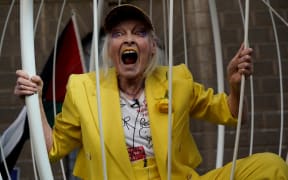
WikiLeaks founder Julian Assange gestures from the window of a prison van as he is driven into Southwark Crown Court in London on 1 May 2019. Photo: AFP / DANIEL LEAL
By Riley Stuart, ABC News
Outside, supporters chanted his name and held placards bearing his face, while inside, lawyers told the overflowing courtroom of a "truly breathtaking" plot to poison him.
But Julian Assange was not there to witness any of it.
The Australian did not appear as his last-ditch attempt to avoid extradition from Britain to the United States got underway Tuesday at London's Royal Courts of Justice.
Assange - who is being held across town at HM Prison Belmarsh, and faces a slew of espionage charges in America - had been given permission to attend the hearing in person.
However, when proceedings began, his barrister Edward Fitzgerald KC told the court the WikiLeaks founder was too ill to come, or even listen in via video link from jail.
Assange's wife, Stella, last week described the 52-year-old's health as "in decline, physically and mentally".
Outside court, Rebecca Vincent, a director at Reporters Without Borders, said she was "concerned" by Assange's inability to appear in court, and that when she last saw him in jail on 16 January, he was "unwell and in pain".
His legal options in the UK are running out.
Assange, 52, is asking the High Court of England and Wales permission to appeal a decision that would see him handed to American authorities.
He is facing extradition to the US, where he has been charged with 18 criminal offences, including obtaining, receiving and disclosing classified information.
The charges relate to material published on Assange's WikiLeaks website in 2010.
That information - given to him by soldier-turned-whistleblower Chelsea Manning - detailed evidence of, amongst other things, war crimes committed by US forces in Iraq and Afghanistan.
Assange was living in the United Kingdom at the time of publication, and this hearing represents his final legal avenue in that jurisdiction to avoid the extradition.
If he is successful, he will remain is custody while the High Court hears an appeal at a later date.
If he is not, Assange could try and take his case to the European Court of Human Rights - although legally, it would be possible for British authorities to send him to the US before that.
He could face 175 years in custody if convicted on the charges in America.
'Murderous sketches and plans'
Fitzgerald KC on Tuesday told the court all the information his client had published was in the public interest and that the offences Assange had been charged with were political, something which would make him exempt from extradition under the treaty that exists between the UK and US.
He said Assange had effectively become the "spokesperson for a global political movement against the United States", which amounted to being "almost like an opposition party".
Fitzgerald told the court the "revelations" Assange had published changed government policy in the US.
The court heard arguments from Assange's legal team on Tuesday, before lawyers for the US state their case on Wednesday.
Another of Assange's barristers, Mark Summers KC, took aim at the District Judge at Westminster Magistrates Court, who had in 2021 thrown out most of his legal team's attempts to block the extradition.
Summers KC on Tuesday told the court there were several "red flags" the previous judge should have considered, including a "truly breathtaking" CIA plot to poison or kidnap his client.
The barrister pointed out that, while the plan was presented as evidence at the time of Assange's hearing in January 2021, more details had emerged in a news story published by Yahoo later that year.
"Whatever her reasons for not considering the evidence of the plot to kidnap or poison the defendant, there is compelling evidence now in existence that the plot was real," Summers KC told the court.
The lawyer told the court that the news story had detailed how "murderous sketches, plans and options" were requested by, and presented to, then-US president Donald Trump in 2017.
"This extraordinary plan only fell away when the UK authorities weren't terribly keen on renditions or the potential for a shootout in the streets of London," he said.
Assange has been behind bars since April 2019 when London's Metropolitan Police arrested him inside the Embassy of Ecuador, on Kings Cross Road, where he had resided for almost seven years while claiming political asylum.
His legal team argue the US Espionage Act 1917, under which 17 of Assange's 18 charges fall, has never been used to prosecute publishers before.
They also argue extraditing Assange, who is not an American citizen and was not living or working in the US at the time of the alleged offences, would represent an unbridled extension of Washington's judicial reach.
Outside court, Stella Assange described her husband as a political prisoner who's life was at risk.
"He should never be extradited to the United States," she said.
"He would never be safe. The United States plotted to murder my husband."
The Australian government and opposition are both against the extradition, with Prime Minister Anthony Albanese last week telling federal parliament he wanted the process resolved "amicably".
Manning was released from custody in 2017 after having her 35-year prison sentence commuted to seven years by then-US President Barack Obama.
The hearing continues.
This story was originally published by the ABC.






